How To Apply For A Canadian Working Holiday Visa (IEC) If You’re From The UK
Embracing Canada’s sprawling landscapes and warm-hearted cities is a dream many from the UK cherish, even me. For those aged 18-35, the Canadian working holiday visa, governed by the IEC, is your golden ticket to immerse yourself in Canada’s rich multicultural tapestry. Dive into this guide and embark on an unforgettable journey. Sadly, the dreaded Covid scuppered my grand plans for my working holiday visa in Canada, but there’s nothing stopping you!

The view of Vancouver from my plane window
Can a UK citizen get a Working Holiday Visa?
Yes, UK citizens are among the privileged nationals who can apply for a Working Holiday Visa in Canada. The IEC program is available in several countries, with the UK being one of the prominent participants. However, ensure you meet the age, financial, and health requirements before applying. There are also caps on the number of visas issued each year, so not everyone who applies will be successful. Unlike Australia and New Zealand working holiday visas, there is a quota of around 5,000 visas for people from the UK. Applying early and ensuring your application is complete and accurate will improve your chances.
The 2024 pools are expected to open around December / January 2024.
How do I apply for a Canadian Working Holiday Visa from the UK?
The Canadian Working Holiday Visa, known officially as the International Experience Canada (IEC) program, is accessible through a few steps:
- Step 1: Check Eligibility. Ensure you’re between 18 and 35 years old, have a UK passport valid for at least two more years, and possess the equivalent of CAD$2,500 to cover initial expenses. Full eligibility requirements can be found here.
- Step 2: Create an account on the Immigration, Refugees, and Citizenship Canada (IRCC) website.
- Step 3: Fill out the IEC form. This involves providing personal details, education history, and any previous work experience.
- Step 4: Submit and wait. Once the application is submitted, you’ll be entered into a pool of applicants. Invitations are then sent out randomly until all spots are filled or the season closes.
What to do once you’re invited to apply for a Canadian Working Holiday Visa
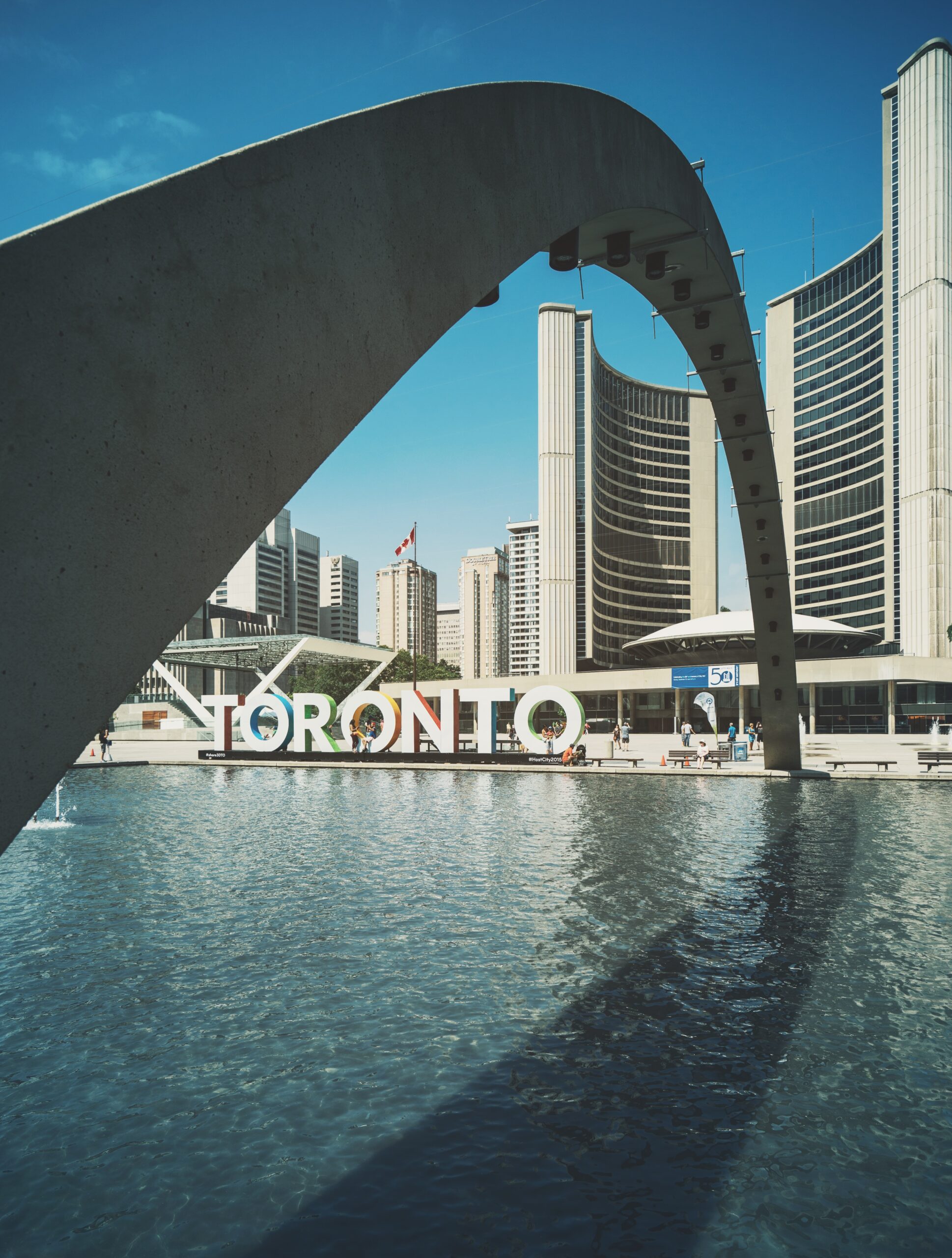
The Toronto sign in Toronto, Canada
Been invited to apply? Congrats! Getting an invitation to apply (ITA) from the pool is a significant step, but there’s more to be done. Here’s a step-by-step guide to what happens next and how to proceed
1. Receive the ITA Notification:
- Once selected from the pool, you will receive an ITA notification in your account. This invitation informs you about the next steps and provides a deadline by which you need to submit your application, typically within 10 days.
2. Gather Necessary Documents:
- Begin by assembling all the required documents, including your passport, recent photos that meet Canadian visa specifications, a copy of your CV, and any other specified forms or proofs. If a medical exam or police certificate is required, you’ll be informed. Some jobs might necessitate a medical exam regardless. You will also need to get your biometrics taken at an accredited place in then UK (more information on this below).
3. Complete the Visa Application Form:
- Within your account, there’ll be an option to apply for the IEC (International Experience Canada) visa. Ensure you fill out every section diligently and without errors. Double-check dates, names, and other details.
4. Pay the Application Fees:
- As of the last update, the fee for a working holiday visa is CAD$153, though this could change. The payment portal is integrated into the application process. Make sure you have a valid credit or debit card.
5. Submit Your Application:
- Once you’ve reviewed everything, submit your application before the deadline. Missing this deadline means you’ll have to start over, so ensure punctuality.
6. Wait for a Port of Entry (POE) Letter:
- If your application is approved, you’ll receive a Port of Entry (POE) letter of introduction. This is not your work permit but a document you’ll present upon arrival in Canada. The POE letter will be sent to your account, and it’s essential to print and keep a copy with you when traveling to Canada.
7. Prepare for Arrival in Canada:
- Before you arrive in Canada, ensure you have travel insurance covering your stay’s duration. This is a requirement. You should also have proof of sufficient funds to support yourself in Canada – typically CAD$2,500 or more.
8. Arrival in Canada & Border Interview:
- Upon arriving in Canada, present your POE letter, passport, and other documents to the Canadian Border Services Agency (CBSA). You’ll undergo a brief interview. Answer all questions honestly. If everything is in order, the officer will issue your work permit then and there.
9. Activate Your Work Permit:
- The permit will specify the type of work you can do, the employers you can work for, where you can work, and how long you can work in Canada. With this permit in hand, you’re now ready to kickstart your Canadian working holiday adventure!
Canada working holiday visa biometrics in the UK

Montreal, Canada
Before you pack your bags, there’s a key step: obtaining your fingerprints (biometrics) for the visa application. Here’s a concise guide to ensure this process is smooth:
- Find an Accredited Agency: The first step is to locate an accredited fingerprinting agency in the UK. The Government of Canada website has a list of recognized agencies worldwide. If you’re in or near London you can get your biometrics at the Visa Application Centre.
- Schedule an Appointment: Once you’ve identified a nearby agency, book an appointment. Most agencies have an online booking system, but some might require a phone call.
- Prepare the Necessary Documents: On the day of your appointment, bring along valid photo identification, like your passport, and any specific forms or documents required by the agency.
- Attend the Appointment: Arrive a little early to ensure you have ample time. The fingerprinting process is swift and painless, often completed within minutes.
- Submission: After capturing your fingerprints, the agency will provide you with a confirmation or a receipt. Some agencies may offer to send your fingerprints directly to the Canadian authorities, or you may need to submit them as part of your visa application.
Remember, the biometrics process is crucial for your visa approval.
Should I go through a company to get my Working Holiday Visa?
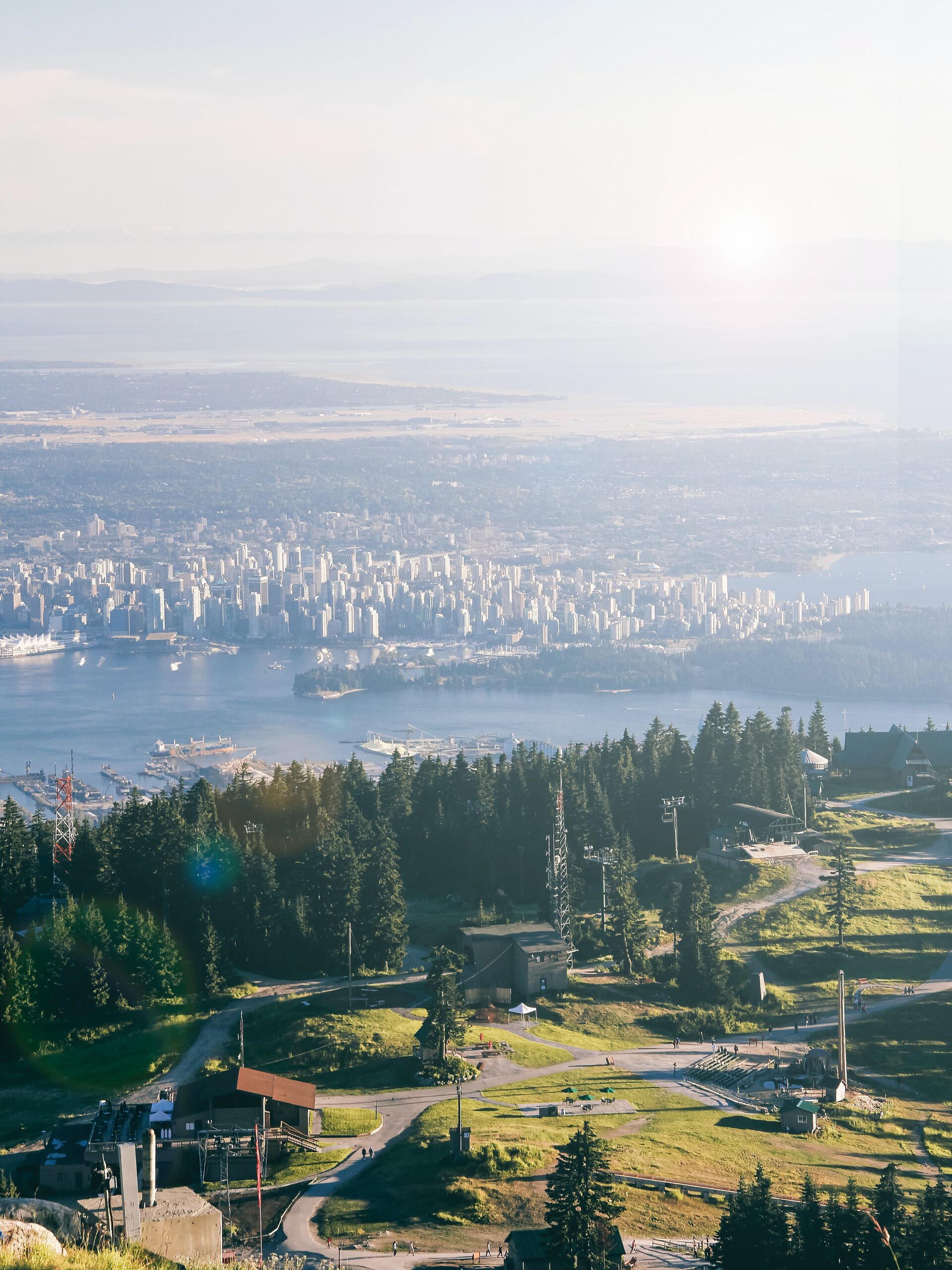
Vancouver, Canada
Putting myself in your shoes, I’d gently advise against using an agency for your Working Holiday Visa journey from the UK to Canada.
The charm of the Canadian working holiday visa process lies in its unpredictability, and agencies, with all their promises, don’t really have a magic wand. The truth is, their chances are just like yours, and sometimes they ask for a pretty penny without offering much in return.
Now, while they might offer a helping hand with job placements, trust me if you’re open-minded about job roles, Vancouver’s vibrant streets have plenty of opportunities waiting for you. Just strolling around the city we saw countless lovely cafes, shops, and restaurants with ‘We’re Hiring’ signs – and this was just as Covid was hitting hard.
Navigating the Canadian Working Holiday visa on your own is not just doable, it’s a rewarding experience in itself.
Is a Canadian Working Holiday Visa worth it?
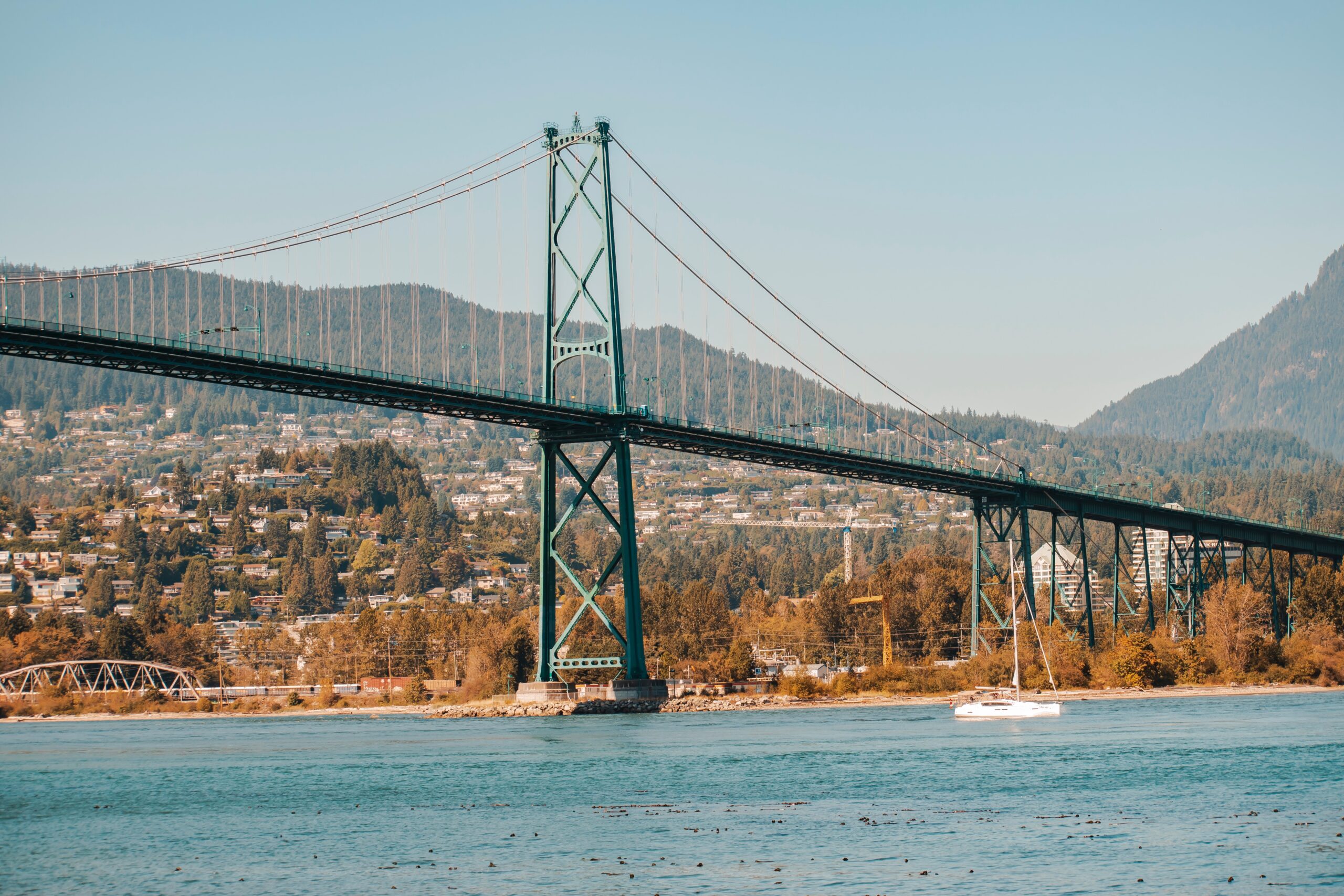
Vancouver, Canada
You’re asking someone who has had three working holiday visa experiences in three different countries – so I think you can guess what my answer will be. Whilst Canada did not work out for me due to the pandemic, I know heaps of people it did work out for and heaps of Canadians who love where they live. Not convinced? Well here are 10 reasons why securing a working holiday visa for Canada is a brilliant idea for those from the UK:
1. Broaden Horizons and Personal Growth
- Immersing oneself in a different culture and environment is an invaluable experience. Canada’s diverse society helps UK citizens learn about different worldviews and challenges them to grow personally and professionally.
2. Employment Opportunities
- Canada’s expansive territory and diverse industries—from film to tech, tourism to forestry—provide a wide range of job opportunities for UK nationals. This gives them a chance to expand their skill set and possibly discover a new career path.
3. Improve Language Skills
- While both countries speak English, the Canadian experience offers a unique chance to pick up nuances of North American English. Additionally, those stationed in Quebec or other French-speaking areas can hone their French language skills.
4. Unmatched Natural Beauty:
- From the Northern Lights in Yukon to the Rockies in Alberta and the maritime charm of the Atlantic provinces, Canada offers natural wonders that are truly unique, making it a paradise for outdoor enthusiasts.
5. Ease of Transition
- Given the shared history, language, and cultural similarities, UK nationals often find it easier to adapt to life in Canada compared to other international destinations. (I’ve gone into some more detail further down on Canadian cultural etiquette and some of the differences there are to the UK).
6. Networking:
- A working holiday in Canada can help UK citizens build an international network. These connections might prove beneficial for future job prospects, both in Canada and globally.
7. Travel While Earning:
- The working holiday visa allows individuals to fund their travels through intermittent work. This way, one can explore Canada without exhausting their savings.
8. Experience a Different Quality of Life:
- From universal healthcare to friendly communities and a lower population density, living in Canada can offer a refreshing change from the hustle and bustle of UK cities.
9. Educational Opportunities:
- For those considering further education, a stint in Canada can be a prelude to studying in one of its top-tier universities or colleges. Being in the country can help one get a better feel for the education system and potential institutions.
Thinking of a different country to get a working holiday visa? Check out my guides on how to get a working holiday visa for New Zealand and Australia.
What are the top destinations for working holidaymakers in Canada?
Vancouver, British Columbia
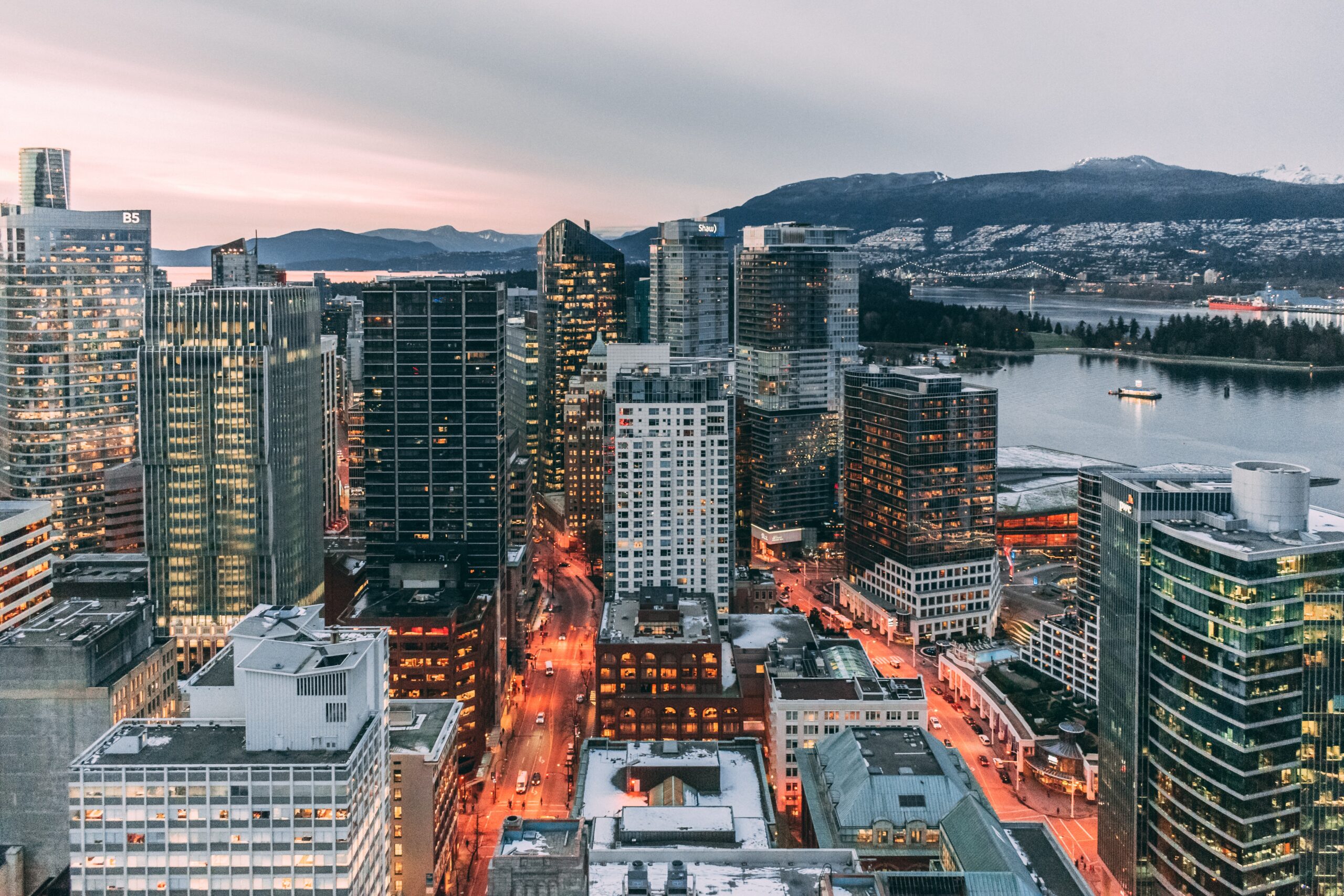
Nestled between the Pacific Ocean and the Coast Mountain Range, Vancouver boasts a mild climate, stunning views, and a vibrant arts scene. Its diverse job opportunities in sectors like film, technology, and tourism make it a magnet for young professionals.
Housing: Many working holidaymakers opt for shared accommodations in areas like Kitsilano, East Vancouver, or Downtown to manage costs and connect with peers.
Toronto, Ontario
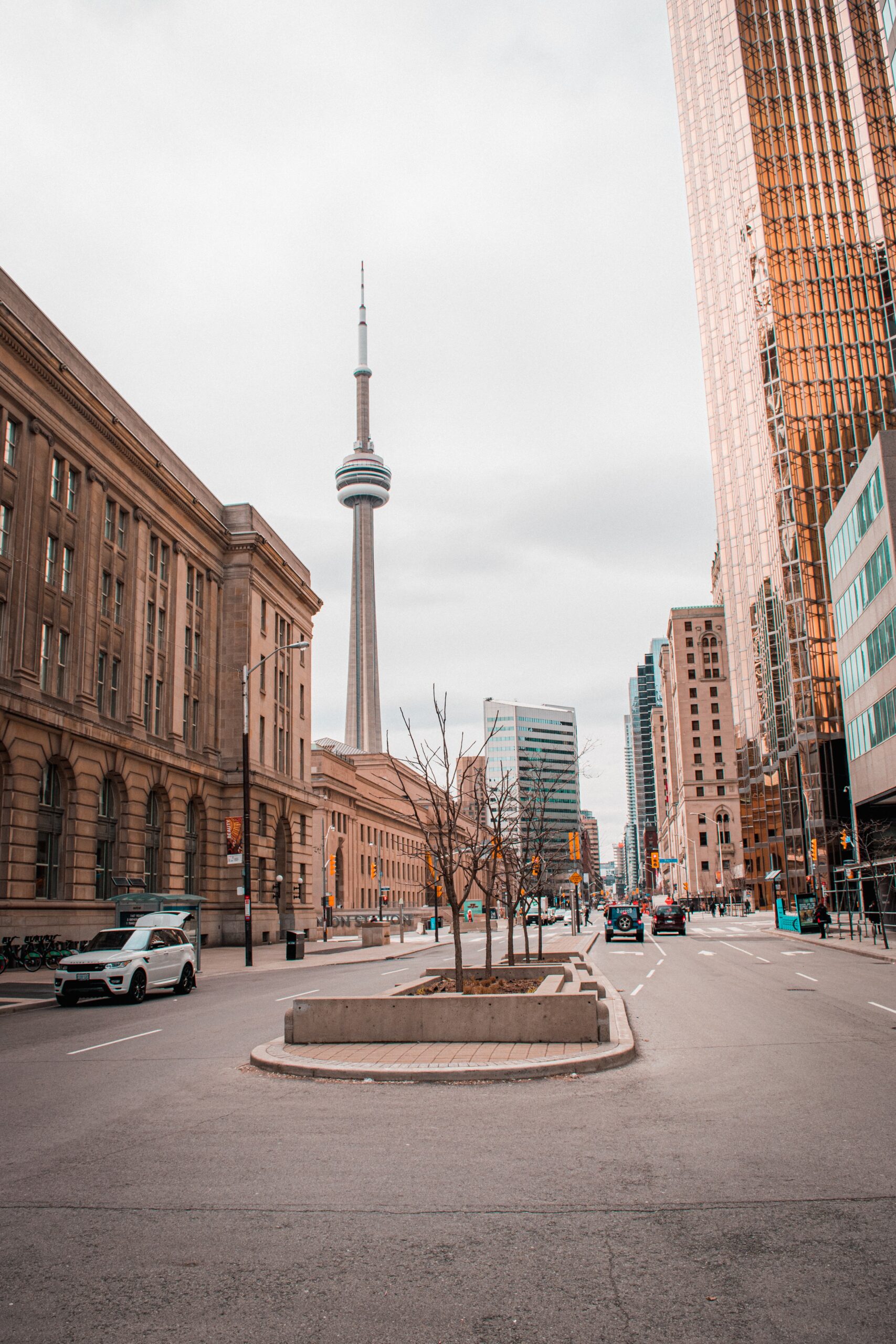
As the country’s largest city, Toronto offers vast job opportunities, from finance to arts. Its multicultural vibe ensures anyone from any part of the world feels at home.
Housing: Neighbourhoods like Kensington Market, Queen Street West, and The Annex are trendy among young people and provide a blend of rental options suitable for various budgets.
Banff and Jasper, Alberta
For those looking to combine work with adventure, these towns located within national parks are ideal. With a booming tourism sector, job opportunities in hospitality and tourism are abundant.
Housing: Due to the seasonal nature of work, many employers provide accommodation packages for their staff, making the transition smoother.
Montreal, Quebec
Montreal, with its rich history and culture, offers a unique blend of English and French influences. It’s a hub for arts, music, and festivals.
Housing: The Plateau, Mile End, and Griffintown are popular neighborhoods with affordable rent and a youthful atmosphere.
Whistler, British Columbia
Famous for its ski resorts, Whistler is a winter wonderland that draws many working holiday visa holders, particularly those interested in winter sports and hospitality.
Housing: Many companies offer staff housing, but shared rentals in the village can also be sought out.
Ottawa, Ontario
Beyond its status as the national capital, Ottawa offers a serene living environment with the perks of a big city. Its tech industry is growing, and there are ample opportunities in public services and hospitality.
Housing: Neighbourhoods like The Glebe, ByWard Market, and Hintonburg are popular and offer a mix of housing types.
Calgary, Alberta
Calgary, with its cowboy spirit, is an urban centre close to outdoor delights like Banff. It’s an energy hub and offers roles in various sectors.
Housing: Consider looking into areas like Kensington, Inglewood, or the Beltline for a mix of affordability and amenities.
Halifax, Nova Scotia
Maritime Beauty: For those seeking coastal charm without West Coast prices, Halifax is ideal. It’s a growing city with opportunities in education, health, and the arts.
Housing: Downtown, North End, and South End Halifax offer great rental options for newcomers.
Understanding Canadian Culture and Etiquette
Canadian culture might seem similar to the UK’s at a glance, but a closer look reveals unique nuances. The famous Canadian politeness isn’t a myth. “Sorry” might be the most frequently heard word, especially when navigating busy city streets or even when someone else bumps into you! While regional differences exist, hockey, a love for the outdoors, and community-centered events are some of the unifying cultural threads. Getting your Canadian working holiday visa will no doubt have you picking up the language, accent and hobbies of the lovely Canadians!
Managing Finances in Canada
Understanding your budget in a new country is crucial. Canada, in many respects, has a cost of living similar to the UK. However, prices can vary significantly between cities like Vancouver and smaller towns. Major banks, such as TD, RBC, and Scotiabank, offer services tailored to newcomers, ensuring smooth financial transitions. When budgeting, remember to account for tips in restaurants, which typically range from 15% to 20%.
Navigating the Canadian Healthcare System
Canada prides itself on its universal healthcare. While provinces manage their healthcare, emergency services are generally free. However, for those on a working holiday visa, purchasing health insurance for the duration of your stay will be smart, as provincial coverage might not always apply.
Embracing the Canadian Work Environment
The Canadian workplace balances professionalism with a touch of casualness. While punctuality and commitment are valued, workplaces might also host informal Friday get-togethers or “Jeans Days.” When job hunting, LinkedIn and local job boards can be invaluable. Remember, a Canadian CV, often referred to as a resume, is typically shorter than its UK counterpart, focusing on concise points.
Canada’s Culinary Delights
Beyond maple syrup, Canada offers a plethora of dishes. Dive into a comforting bowl of poutine — fries smothered in cheese curds and gravy. Or for those with a sweet tooth, butter tarts and Nanaimo bars await. Cities like Toronto and Vancouver also boast global cuisines, from dim sum to Indian curries, reflecting the country’s multicultural fabric.
Travelling the Great White North
Canada’s vastness means internal flights can be long but essential for coast-to-coast travel. However, for a scenic journey, consider trains like the “Canadian” from Toronto to Vancouver. For daily commutes, cities like Calgary, Toronto, and Montreal have extensive public transit systems.
Dressing for Canadian Weather
Prepare for four distinct seasons. While summers in cities like Toronto can be hot and humid, winter requires serious bundling up. A good winter jacket, waterproof boots, and layers are your best friends, especially if you’re exploring regions with heavy snowfall.
Exploring Canada’s Natural Beauty
Canada’s national parks are a testament to its untouched beauty. Whether it’s hiking in Banff amidst the Rockies’ backdrop or exploring the coastal beauty of Pacific Rim National Park, nature enthusiasts will never be short of options.
Building Connections in Canada
Canadians are known for their welcoming nature. Engage in community events, join clubs or sports teams, and don’t hesitate to strike up a conversation. Platforms like Meetup can also connect you with groups sharing similar interests, making the Canadian social experience a memorable one.
Canada’s vast expanse offers a range of living experiences for those on a working holiday visa. Whether you’re drawn to the mountainous terrains of the West, the bustling urban centers of the East, or the maritime allure of the Atlantic, there’s a Canadian city or town that’s the perfect fit for your adventure. Research, network, and stay open-minded, and you’ll find your home away from home in the Great White North.



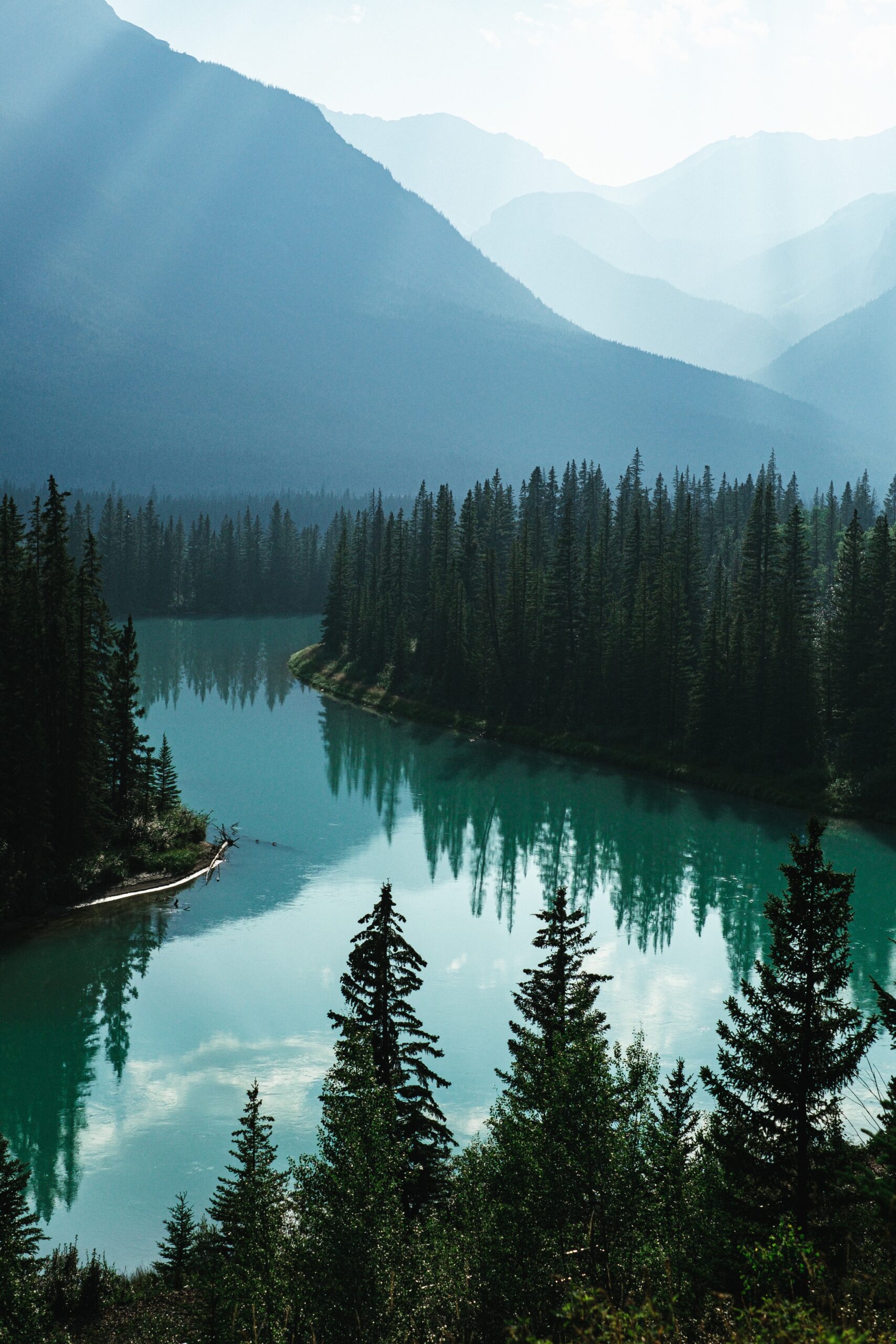


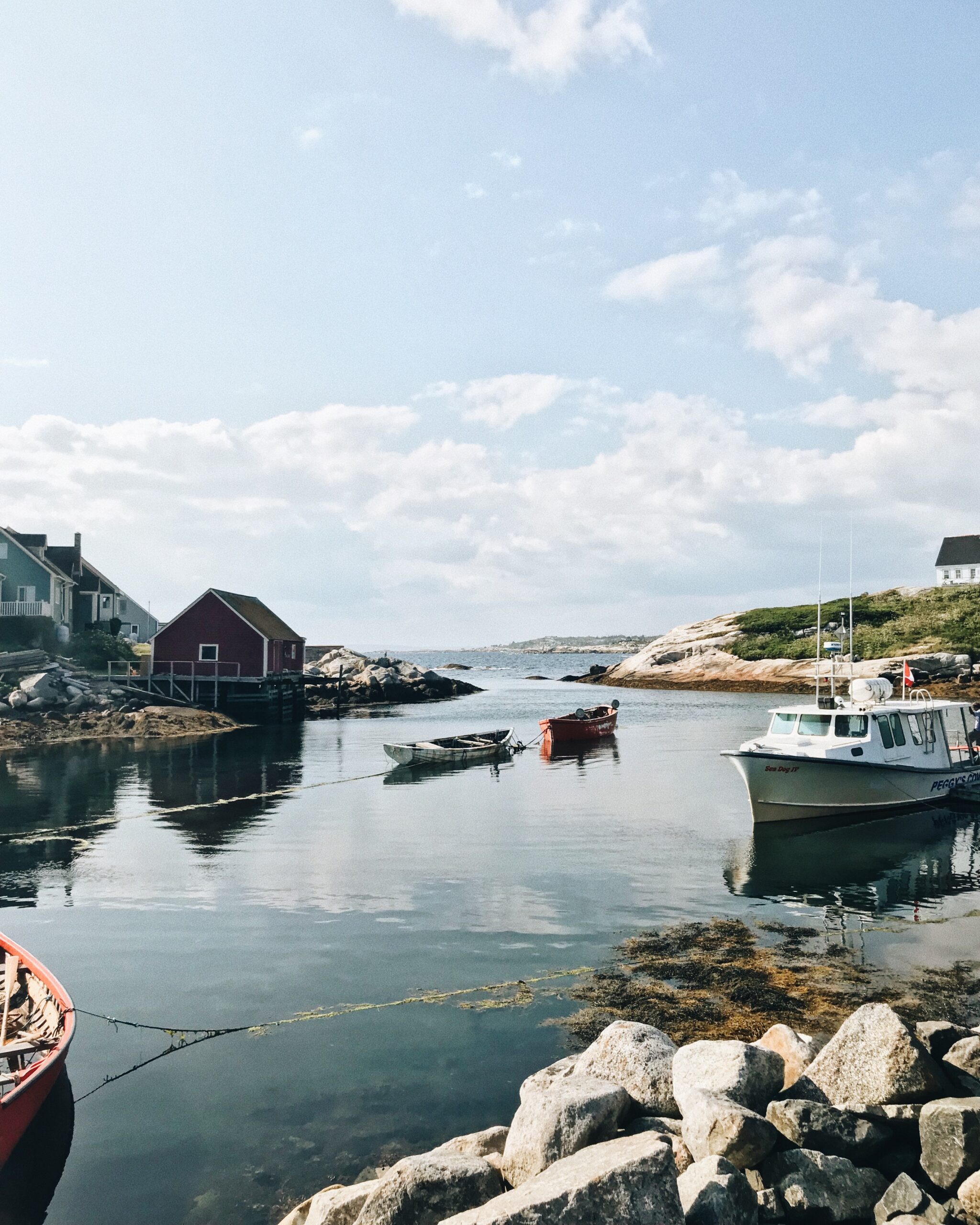





















SOCIAL